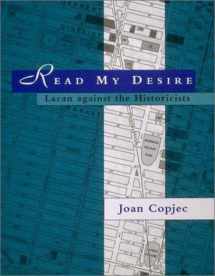
Read My Desire: Lacan Against the Historicists
Book details
Summary
Description
In Read My Desire, Joan Copjec stages a confrontation between the theories of Jacques Lacan and Michel Foucault, protagonists of two powerful modern discourses - psychoanalysis and historicism. Ordinarily, these discourses only cross paths long enough for historicists to charge psychoanalysis with an indifference to history, but here psychoanalysis, via Lacan, goes on the offensive. Refusing to cede historicity to the historicists, Copjec makes a case for the superiority of Lacan's explanation of historical process, its generative principles, and its complex functionings. Her goal is to inspire a new kind of cultural critique, one that would be "literate in desire," that would be able to read what is inarticulable in cultural statements.
Choosing a variety of battlegrounds, from historical phenomena - the 40,000 unsettling photographs of Moroccan drapery taken by Lacan's mentor, G. G. de Clérambault; the coincidence between vampire literature and the eighteenth-century imperative to breast-feed; the recurrent emptiness of urban spaces in film noir; the rise of democracy and questions of human rights - to theoretical concepts such as the gaze, cause, and sexual difference, Copjec imagines the blows that each contender might strike. Although Lacan emerges the victor, one has a sense that for Copjec the contest is close, that she is interested not in simply dismissing Foucault but in seizing his theory at those moments when its concerns and strategies are similar to Lacan's. She is intent on understanding how two compelling theories come to diverge, how small differences distort common assumptions.
Establishing the links between psychoanalysis and critical philosophy, Copjec treats psychoanalysis not as a private language but as the mother tongue of modernity. She thus makes Lacan's famous "return to Freud" a return, as well, to the best principles of the Enlightenment. By this maneuver she forces us to question the historicist dialect that we have been taught to speak and that we all but take for granted and to regret the loss in it of psychoanalysis's more rousing accents.


We would LOVE it if you could help us and other readers by reviewing the book
Book review



